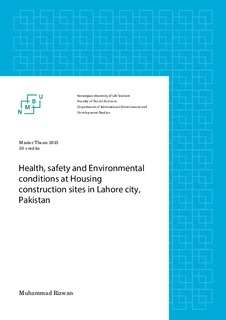Health, safety and environmental conditions at housing construction sites in Lahore city, Pakistan
Abstract
The construction industry is an important section of the economy and is generally considered as a driver of economic growth in many countries. It also provides opportunities for employment for diverse sections of society. Regardless of its importance, construction industry is considered as hazardous with frequent accidents to workers. Nevertheless, knowledge and awareness on how health, safety and environmental issues are managed on Pakistani construction sites is limited. This paper therefore, intents to look at the current practices of Health, safety and environmental risk assessment, management communication and control in Pakistani context. In pursuing this objective, multiple strategies (Pilot interviews, Questionnaire survey and Case study) were used whereby six pilot interviews were conducted with senior management staff of five construction companies, about 100 questionnaires was distributed (15 site managers, 5 owners, 8 contractors, 5 sub-contractors and 67 site workers) for questionnaire survey through purposive sampling to determine the health, safety and environmental measures currently applied on construction sites and lastly one housing construction site was selected in Lahore city as a case study.
The findings from pilot interviews indicated that majority of the respondents have a poor degree of risk awareness and don’t seem to take health, safety and environment as a major issue. The results of questionnaires survey show that the majority of causalities are fall from heights, electric shocks, stuck in between the plants, struck by an object or machinery. Similarly there was a lack of HSE management plan, inadequate first aid facilities, lack of personal protective equipments and lack of accident reporting mechanism. The results from case study show that all the responsibility on risk management was with the construction manager. There was no systematic method for risk assessment, but rather hazards were assessed based on individual judgement directed by experience and educational background. In the meantime, hazard information were spread through safety meetings and controlled by Personal protective equipment.

